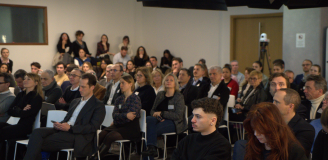

How can we help you?
 Retour aux actualités
Retour aux actualités
2022 review and 2023 outlook for the digital sector: +7.5% growth expected in 2022, and promising prospects for a sector in search of talent
Syndicat activityNumeum, the trade organization for France's digital ecosystem, has released the results of its second half-yearly conference of the year. While last July, growth in the digital sector for the current year was announced at +7.4%, estimates have been revised upwards slightly: it's now +7.5% growth expected in 2022, and +5.9% for 2023.
Outlook confirms the sector's positive momentum
In an unstable economic and geopolitical context, the digital sector is resilient in 2022. For the sector as a whole, Numeum slightly reassesses its initial growth forecast at +7.5% for 2022. All business lines benefit from higher sales:
-
Estimated 2022 growth for Cloud publishers and platforms: +11.3%
-
2022 estimated growth for Digital Services Companies (DSCs): +5.1%.
-
2022 estimated growth for Engineering and Technology Consulting (ICT) activities: +7.4%
Growth in the digital sector is largely driven by the cloud (+24.5%) and its implementation in many companies. Growth is also supported by its classic levers: Big data, IoT services and digital transformation. Lastly, investment in cybersecurity rose by 11.3% to 3.3 billion euros due to the upsurge in cyberattacks in recent years.
The size of the digital market is estimated at 60.9 billion euros in 2022: 35.5% of the market for software publishers and cloud platforms with 21.6 billion euros in sales, 52.4% of the market for ESNs with 31.9 billion euros and finally 12.1% for Engineering and Technology Consulting activities with 7.4 billion euros.
The rise in corporate IT budgets looks set to boost growth in 2022. According to PAC's survey of 100 CIOs for Numeum, 48% of CIOs declare an IT budget increase for 2022, up 10% on 2021.
For corporate customers of digital players, the main IT objectives are, in order of priority: information system security (very important for 62% of CIOs), data analysis (49%) and improving the customer experience (43%). There has also been a sharp increase in the importance attached by CIOs to teleworking (implementation, tools...) and agile development. Taking CSR issues into account is a criterion required almost systematically in calls for tenders to suppliers (source: PAC survey, for Numeum)
.A sector that recruits but faces a talent shortage
For the 12th year in a row, the digital sector is creating jobs. The digital sector's salaried workforce represented a total of 572,126 people in 2021 (sources BIPE, Numeum and ACOSS data), and there were 34,000 net new salaried jobs in 2021. This dynamic trend looks set to continue, with recruitment up 66% and stable at 24% in the second half of 2022.
However, companies are facing a war for talent. The problem is not new, but is intensifying, becoming a drag on growth. The sector is facing a shortage of talent trained in all the skills needed to deploy the latest technological innovations and support the entire French economy in its digital transformation.
According to APEC, private sector companies are primarily looking for managers in IT development professions (4 out of 10 job offers). The industrial and technical IT and big data professions show the strongest growth in terms of job offers in the first half of 2022 compared to the first half of 2021.
According to APEC, companies in the private sector are primarily looking for IT development managers.
While the question of remuneration is the leading cause of departures, digital companies are relying on several levers to try and retain their talent: hybrid working, training, career development, incentive plans or even retraining in the most buoyant and innovative subjects.
5 key growth drivers to continue boosting France's digital sector
As established in the previous half-year, 5 strong trends continue to provide major impetus to the digital sector:
- Digital transformation (a 7.6 billion euro market with +10.2% growth in 2022): such as customer experience, e-commerce, dematerialization...
- The Cloud C&SI - Consulting and Systems Integration (a 15.3 billion euro market with +24.5% growth in 2022): verticalized clouds, globalized collaboration, the generalization of container approaches, modernization and apps/infra transformation...
- Big Data (a 2.3 billion euro market with +22.1% growth in 2022): the collection and use of data to evolve business models, develop new services...
- IoT (a 5.9 billion euro market with +19.1% growth in 2022): developing new solutions with 5G and edge computing...
- Security (a market worth 3.3 billion euros with +11.3% growth in 2021): with growth in investments and outsourcing to ward off the upsurge in risks, attacks...
Responsible digital on the front line
Responsible digital is a lever of choice for reconciling environmental and digital transitions. According to the survey carried out by PAC, for Numeum between September 28 and November 14, nearly 80% of digital companies are implementing specific measures to limit their energy consumption this winter. More than half of these companies have decided to anchor their actions more deeply and sustainably by training their employees in climate and energy sobriety issues.
Among the sector's new challenges, CSR is a subject that players have seized on very quickly. The survey reveals that 93% of CIOs carry out calls for tender with the obligation to demonstrate responsible actions for their suppliers (vs. 66% in 2020) At the same time, 76% of digital companies respond to at least one call for tender with CSR criteria.
More and more Responsible Digital projects for CIOs in 2023: CIOs are getting to grips with the environmental issues linked to their own activity: 28% of them have IT projects that support their company's "business" CSR issues, and 57% will have such projects in 2023.
Finally, according to Motherbase's barometer of startup employment in France, we can observe a fine recruitment dynamic in greentech and HRtech within French startups: 4,335 jobs were created in these two sectors from January to November 2022. This job creation dynamic is greater than in other sectors.
In 15 years, the digital market has enjoyed a fine growth trajectory and is again experiencing strong momentum this year, which is being driven by the digital transformation of organizations. However, digital companies are facing a major talent shortage. Training must remain one of the priorities for 2023 in order to continue to focus on skills development and prepare for the future."
Because there will be no digital transition without an ecological transition, the sector has a dual responsibility: to embark on a responsible trajectory based on consideration of the sector's societal and environmental impact, and to highlight the potential of digital technology in the service of a more inclusive, ethical and ecological society. Understanding these issues is an essential condition for guaranteeing our country a digital transition with a positive impact," comments Véronique Torner, Vice President in charge of Responsible Digital at Numeum.
Follow us

Rejoignez la première organisation professionnelle de l’écosystème numérique français et participez à la transformation numérique de l'industrie et des services.
BESOIN DE PLUS D’INFORMATIONS ?
Pourquoi adhérer ?CONVAINCU ?
Adhérer en ligne !

















